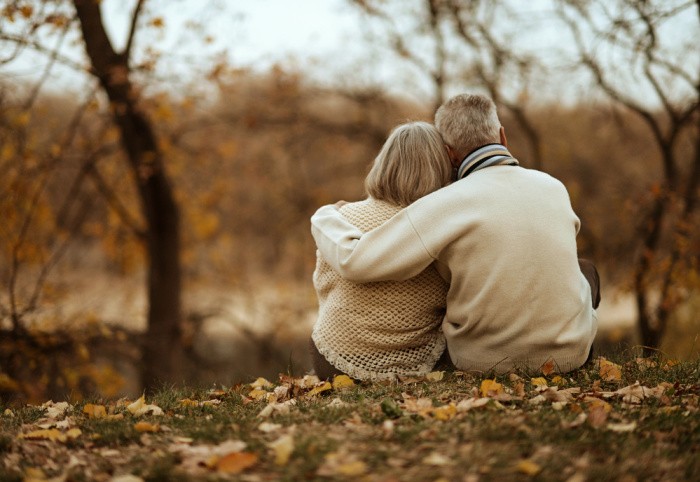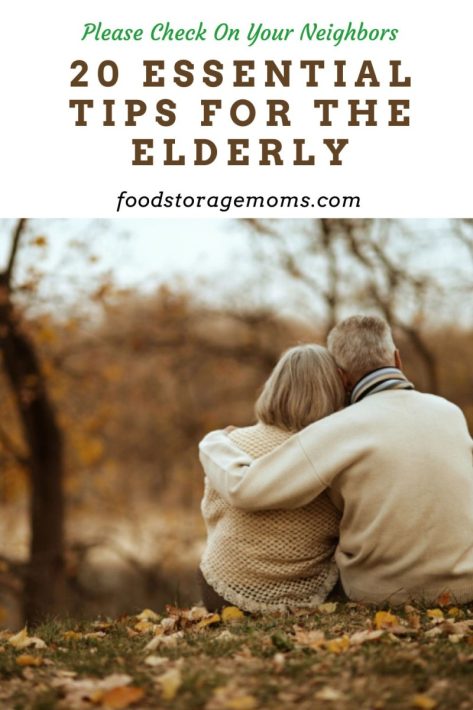
Emergencies can strike without warning, making preparation crucial for everyone, particularly the people (over 70). Our needs and challenges evolve as we age, requiring careful planning and consideration to ensure safety and well-being during a crisis. I am considered older (over 70), but I want to share 20 essential tips for the elderly (over 70). The Best Ways To Help The Elderly (over 70).

1. Create a Support Network
Building Connections
Identify neighbors, friends, and family members who can assist during an emergency. Please make sure they are aware of your specific needs and medical conditions, particularly if they are chronic health conditions. Regularly update these people regarding any changes to your health or emergency plans. How to Connect with Like-Minded Emergency Preppers
Communication is Key
Establish clear lines of communication with your support network. Share contact information and designate primary and backup contacts. Regularly check in with your network to maintain strong relationships.
2. Keep a Communication Plan
Emergency Contacts List
Maintain a list of emergency contacts, including family, friends, healthcare providers, and local emergency services. Keep this list in a readily accessible location. Communication Options for Your Family During a Disaster
Backup Communication Devices
Ensure you have a charged cell phone with a backup battery. Consider investing in a medical alert system that can notify emergency services if you can’t call for help.
3. Compile a Basic Emergency Kit
Essential Supplies
Assemble a basic emergency kit with water, non-perishable food, medications, first-aid supplies, a flashlight, batteries, and a whistle. Ensure these items are easily accessible, and check expiration dates regularly. What You Need in Your Emergency Kit
Water is an essential item for all of us when it comes to natural disasters, emergencies, and general preparedness. Some official government organizations and the American Red Cross suggest one gallon of water per person per day. I’ve always recommended four gallons of water per person daily to cover hydration, cooking, personal hygiene, and limited laundry chores.
Customization for Specific Needs
Tailor your emergency kit to your needs, including eyeglasses, hearing aids and hearing aid batteries. Don’t forget comfort items like a blanket and personal hygiene products.
4. Prepare a Medical Information Kit
Detailed Medical Records
Create a detailed list of your medications, dosages, medical conditions, allergies, and doctors’ contact information. Store this information in a waterproof container. Are You Prepared for a Medical Emergency?
Medical ID and Alerts
Consider wearing a medical ID bracelet listing your conditions and allergies. This can be invaluable if you are unable to communicate during an emergency. What To Do When There Is No Medical Help
5. Stockpile Medications
Ensuring a Two-Week Supply
Work with your healthcare provider and pharmacist to keep at least two weeks of prescription and over-the-counter drugs. Rotate your stock to avoid expired medications. 35 OTC Medications You Should Store
Storage Considerations
Store medications in a cool, dry place. Consider portable options like pill organizers to make taking your medicines with you easier if you need to evacuate.
6. Document Important Information
Safekeeping Documents
In a waterproof container, keep copies of essential documents such as various identifications, insurance policies, banking, and medical records. Consider using a fireproof safe for additional protection for your sensitive information. Critical Documents You Need for Emergencies
Digital Backups
Scan important documents and save digital copies on a secure cloud or external drive. This ensures you can access your information even if physical copies are lost. If you don’t know how, get a family member, friend, or caregivers to help.
7. Plan for Mobility Issues
Evacuation Preparedness
If you have mobility issues, plan how you will evacuate if necessary. Consider mobility aids like a wheelchair, walker, or cane. Identify accessible exits in your home. What You Need in Your Evacuation Shelter Bags
Transportation Arrangements
Coordinate with family, friends, or local services to ensure you have transportation options in an emergency. Practice using these options to become familiar with the process.Navigating Life-Changing Emergencies: A Guide to Facing an Emergency
8. Prepare for Power Outages
Medical Equipment Needs
Plan for power outages if you rely on medical equipment that requires electricity. Consider purchasing a generator or alternative power sources and ensuring you can use them safely. If you use a CPAP, oxygen concentrator, or other medical devices that require external power, you must have a backup plan. Older adults with special disabilities are at higher risk, so disaster preparedness is a prime concern. Don’t wait for someone else to figure things out; be proactive.
Backup Power Solutions
Keep backup batteries for essential devices like hearing aids and communication devices: store flashlights and battery-operated lamps in easily accessible locations. I have a high-voltage Goal Zero backup power bank that can run for a number of hours, and I have solar panels to recharge it when necessary.
9. Stay Informed
Emergency Alerts
Sign up for emergency alerts and weather updates from reliable sources such as local news, government agencies like the National Weather Service, or weather apps. Staying informed allows you to act quickly when necessary. Emergency Food Storage- This Is What You Need Consider a NOAA weather radio to stay on top of important weather trends and alerts.
I have a hand-crank radio I can use if the power goes out and my batteries aren’t usable.
Community Resources
Familiarize yourself with local community resources and emergency plans. Knowing where to find help can make a significant difference during an emergency.
10. Learn Basic First Aid
First Aid Training
Take a basic first aid and CPR course. These skills can help you manage minor injuries or health issues until professional help arrives. What’s In Your First Aid Kit?
Regular Refresher Courses
Refresh your first aid knowledge regularly. Many organizations offer online courses that can keep your skills up to date.
11. Prepare Your Home
Safety Equipment
Ensure your home has smoke detectors, carbon monoxide detectors, and fire extinguishers. Conduct regular checks to ensure they are functioning correctly.
Home Safety Assessment
Perform a home safety assessment to identify and fix potential hazards. Secure heavy furniture, remove tripping hazards and ensure easy access to exits. If needed, get family or professional help with some of these tasks.
12. Secure Important Items
Safe Storage
Store valuables and important documents in a secure, easily accessible location. Consider using a waterproof and fireproof safe. List of the Best Food Storage Supplies for Us
Emergency Access
Ensure trusted individuals know how to access these items in an emergency. Provide them with spare keys or combination codes if necessary.
13. Create a Go-Bag
Portable Essentials
Prepare a lightweight, easily portable bag with essentials ready to go in case of a sudden evacuation. Include items like water, food, medications, personal documents, and a change of clothes.
Regular Updates
Check and update your go-bag regularly to ensure all items are current and in good condition. Replace expired food and medications as needed.
14. Have a Transportation Plan
Evacuation Routes
Know the transportation options available if you need to evacuate. Identify local shelters and evacuation routes and practice using them. If you’re still able to drive, great. Remember that any travel during a flood, hurricane, earthquake, or tornadoes, can be much different. Streets won’t look the same, routes may be subject to detours, and you may be directed to unfamiliar neighborhoods or highways.
Coordination with Helpers
Coordinate with family, friends, or local services to ensure you have transportation assistance if needed. Make arrangements in advance to avoid last-minute issues. Remember that first responders aren’t their to provide transportation support, they may have hundreds of residents they are dealing with.
15. Consider Dietary Needs
Stockpile Special Foods
Stockpile food that meets any dietary restrictions and that you enjoy eating. Ensure it’s easy to prepare and has a long shelf life. If you use a service animal or have other pets, include them in your emergency plans, including needed food and water.
Food Rotation
Rotate your stockpile regularly to ensure freshness. Use older items first and replace them with new ones to maintain a ready supply of necessary foods.
16. Maintain Personal Hygiene Supplies
Essential Hygiene Items
Keep an adequate supply of personal hygiene items, such as soap, hand sanitizer, toothbrushes, toothpaste, and incontinence supplies. Ensure these items are easily accessible, and regularly check stock levels.
Hygiene in Emergencies
Consider how you will maintain hygiene if water supplies are disrupted. Stock up on wet wipes and waterless hand sanitizers to stay clean. Basic Oral Hygiene Tips Everyone Needs
17. Stay Physically Active
Regular Exercise
Engage in regular physical activity to maintain mobility and overall health. Activities like walking, stretching, and light strength training can be beneficial. Fitness for Survival
Adapted Exercises
If you have mobility issues, look for exercises that can be done while seated or lying down. Many senior centers and community organizations offer adapted exercise programs.
18. Review Insurance Policies
Understanding Coverage
Make sure your insurance policies are up to date and understand what is covered in case of an emergency. This includes health, home, and auto insurance.
Keep Documents Accessible
Store copies of your insurance policies in your emergency kit. Consider digital backups for easy access in case the physical copies are lost or damaged. Critical Documents You Need for Emergencies
19. Practice Your Plan
Regular Drills
Regularly review and practice your emergency plan with your support network to ensure everyone knows their role. Conducting drills can help identify and address potential issues. Emergency Preparedness-Make A Plan
Update Plans as Needed
Update your emergency plan as your circumstances change. Ensure everyone in your support network is aware of any modifications.
20. Stay Positive and Connected
Mental Health Importance
Maintain social connections and stay positive. Mental health is crucial in emergencies, so stay connected with loved ones and community groups. Engage in activities that you enjoy and that keep you mentally active. Mental Health Issues After A Disaster
Seek Support
Don’t hesitate to seek professional help if you feel overwhelmed or anxious. Many communities offer mental health resources and support groups specifically for older adults. 50 Things You Should Do Every Year to Prepare for an Emergency
More Tips
- Where to Stay Up to Date on Important Information About Emergency Prepping?
- Navigating Emergency Preparedness with Oxygen
- 7 Quick Tips For Emergency Prepping
Final Word
When you follow these 20 tips, older people can become well-prepared for emergencies. I think it’s essential that older people are just as prepared as everyone else. May God Bless this World, Linda
Copyright Images: Elderly Couple Looking At Lake Depositphotos_122826860_S By Aletia, Mature Couple Sitting By Lake Depositphotos_56140601_S By Aletia
The post 20 Essential Tips for the Elderly appeared first on Food Storage Moms.
from Food Storage Moms
No comments:
Post a Comment